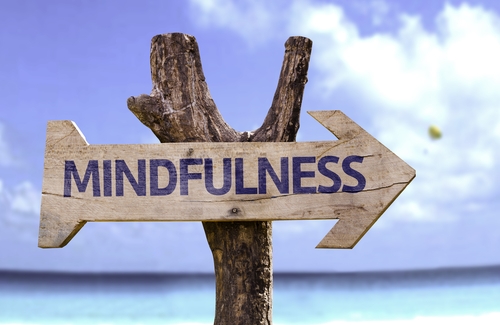By: Design for Change Recovery
Categories:
How Does Mindfulness Help Mental Health Recovery?
You are here:Mindfulness is the practice of being fully present, aware of where one is and what they are doing, and not feeling overwhelmed or over-reactive about what is going on around them. Mindfulness can help greatly with mental health recovery because it grounds the individual and provides them with the resources that they need to overcome stressful situations and symptoms of their mental illness. For example, mindfulness has been used in cognitive-behavioral therapy and has helped individuals with depression and anxiety through meditation, stretching, breathing, and other exercises to help change negative thought patterns. Another example of mindfulness would be for someone to practice just being with stressful feelings instead of trying to avoid them.
Here are some important notes about mindfulness:
- It can be practiced anytime, anywhere. Mindfulness can be practiced informally through being fully present, regardless of what one is doing. Many individuals practice mindfulness more formally through meditation.
- Mindfulness isn’t meant to “cure” or “get rid of” a person’s mental illness – it simply allows the individual to embrace who they naturally are.
- Mindfulness, when cultivated through dedication and practice, can be a transformative experience.
- Anyone can practice mindfulness! Mindfulness does not require anyone to change their beliefs or who they are – anyone who is willing to be in the moment can use this.
- Mindfulness is evidenced based. When a person practices mindfulness, over time, they typically feel that they can take hold of more challenging situations, better than they were able to before.
- Mindfulness does not mean increased happiness. Mindfulness is the practice of accepting things as they are. To be okay with whatever happens, and to know that whatever situation arises, that situation does not have to take control over that person’s emotions.
- Finding resources to practice mindfulness is very easy. Mindfulness is a very common practice, and there are many free websites and videos online to help provide more information on this.
A person should not become upset with themselves if they practice mindfulness a few times and do not feel immediately calmer or more at peace, as that is the opposite of mindfulness! Just as a person learning to play the piano does not stop after one session, a person practicing mindfulness does so throughout each day, and accepts whatever happens.
Mindfulness serves as a powerful tool and can be easily incorporated throughout daily life. The best way to begin practicing this transformative method is to recognize that as human beings, each person is worthwhile, beautiful, and perfectly imperfect!
Mindfulness is an evidence-based treatment method proven to increase healing in mind, body, and spirit. As part of our approach to recovery, Design For Change utilizes mind, body, and spirit therapies, changing lives one step at a time. For information, call us today: (877) 267-3646


